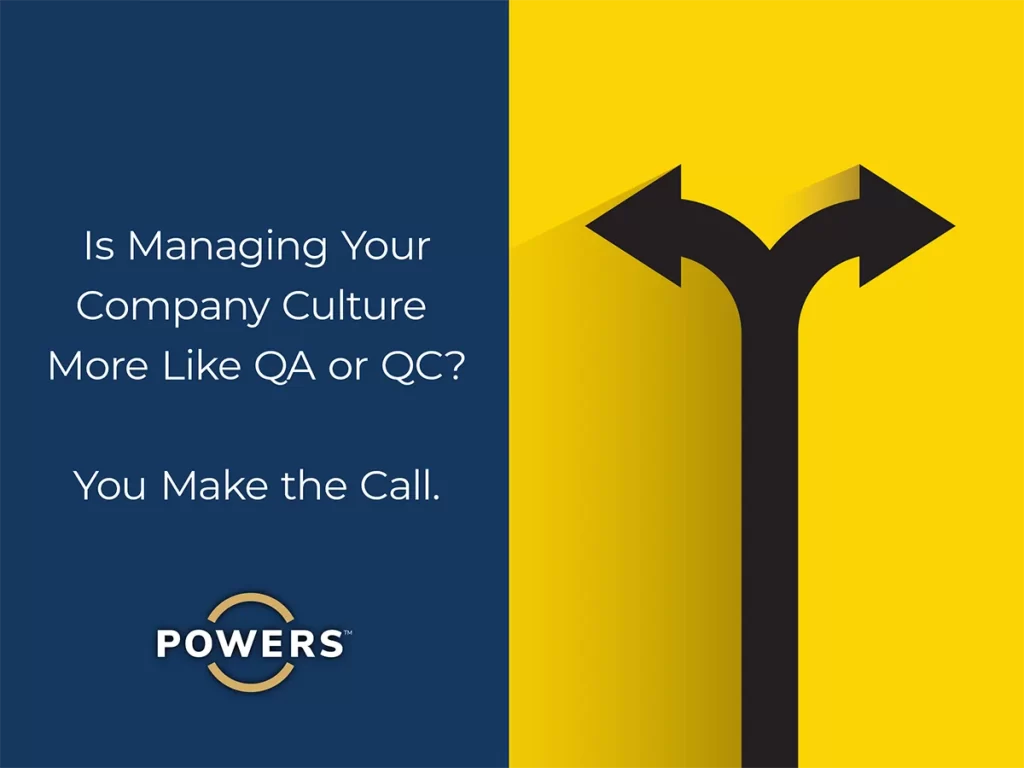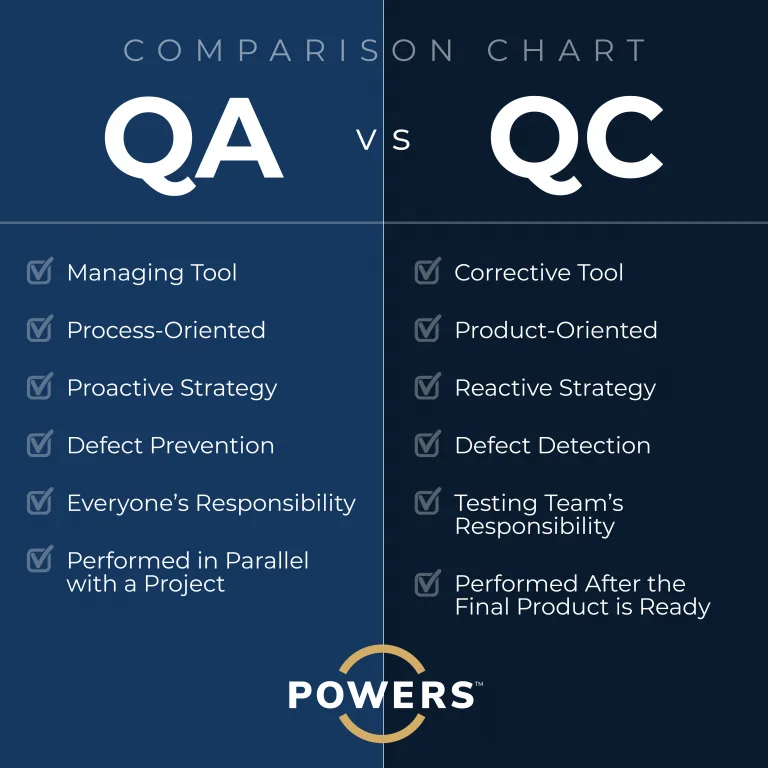
When most industrial operations leaders are asked, “What is your Quality Assurance (QA) or Quality Control (QC) process and performance result for your business,” a credible response is typically provided. If the same question is asked about your company’s Culture Performance Management process and results, could you respond? Most cannot. What if you considered the QA & QC process in the context of cultural performance management? When exploring your current approach to developing and delivering on your company culture, many business leaders may find that their processes may be more like a QA or QC process than initially realized. Knowing the answer to this question will illuminate options for you to consider when implementing, improving, and sustaining your desired company culture.
While both QA and QC approaches have the potential to add value and improve business performance, it is essential to note that they are different. When you consider your own quality management process, which approach do you believe is like your current approach when attempting to develop and implement the leadership culture that you believe is paramount to achieving optimal operational performance outcomes. It is your leaders’ responsibility to implement this process to achieve real Cultural Integrity, which is our way of saying – ‘you act according to our company values.’
Let’s take a closer look at this comparison.
Our argument is framed with one truth: the inputs from your cultural performance management processes determine the outcomes, which are centered around your employees’ experiences. This is relevant when you consider your employee experiences to be the result of your leadership behaviors, interactions, decision making, and management approach. The same principles apply to QA and QC inputs that drive quality performance outcomes.
Understanding the QA and QC Approaches:
Which Quality Management approach aligns with your current Cultural Performance Management process?
Process “assurance” or process “control”?
When applying a quality assurance approach to Cultural Performance Management, leaders ensure the right behaviors, interactions, and decisions are 100% aligned to your company’s cultural values. Proactive management tools are typically used throughout the management process to ensure, in real-time, that the right inputs are happening the right way and at the right time to assure optimal quality is a likely outcome. When proactively ‘assuring’ the outcomes of your company culture, the quality of your employee experience is the result of high-quality management and leadership inputs.
Like a quality control process, corrective cultural performance management tools and processes are used to measure the ‘quality’ of leadership engagement after the leadership behaviors and interactions have produced the employee experience. This is a more reactive method, as the data derived from these tools, like engagement surveys, is gathered, synthesized, analyzed, and then used to determine what adjustments should be made to improve leadership behaviors and interactions in the future.

Process-oriented or product-oriented?
A process-oriented Cultural Performance Management approach is focused on making sure the right values, behaviors, skills, and interactions are built into each step of your process for facilitating your business. They are known and demonstrated by the leadership team in all they say and do.
A product-oriented Cultural Performance Management approach focuses on the attitudes and opinions of the employees. Your employees’ evaluations of your leadership team determine whether they are effective or not based on these employees’ personal experiences.
Proactive strategy or reactive strategy?
A proactive Cultural Performance Management strategy seeks to ensure company leaders are skilled, prepared, and developed in advance to interactions (Cultural Connections) that may occur with other employees. Proactive management means the company leaders know when, where, and how to apply these behaviors and interactions to produce the employee experiences that match the desired cultural performance outcomes.
A reactive Cultural Performance Management strategy seeks to let all the leadership behaviors and interactions occur first, and then measure these inputs (outcomes) through employee opinion or pulsing surveys. These approaches are considered reactive because the perceived outcomes are determined after the leaders’ review of the survey data to determine how best to adjust how leaders behave and interact in the future. Reactive means the company leaders only know, after the fact, how their actions have shaped the employee experience, and how to potentially adjust moving forward.
Prevention of defects or detection of defects?
Prevention of defects within a Cultural Performance Management system means the leaders are making sure the ‘defective’, or less desirable leadership behaviors and interactions do not happen in the first place. They ensure ineffective leadership behaviors and interactions are removed or reduced before they negatively impact the employee experience.
Detection of defects within a Cultural Performance Management system uses the employees’ personal perceptions (opinions, feelings, and emotions) as the measurement of leadership performance. For example, suppose an organization’s Employee Engagement Survey Score is low. In that case, it is inferred that the management behaviors and interactions need to be adjusted to ensure each employee’s opinions, feelings, and emotions are satisfied.
Shared responsibility or individualized responsibility?
Suppose your cultural performance development, measurement, data gathering, and improvement efforts reside within each teams’ daily collective efforts. In that case, your cultural performance management methods are shared among every leader within the organization, like a QA approach.
If your cultural performance development, measurement, data gathering, and improvement efforts reside within a singular group, such as Human Resources, then your cultural performance management methods are considered an individualized responsibility, like a QC Technicians’ role in controlling product quality.
Performed in parallel with, or after, the final product is ready?
If your company’s Cultural Performance Management processes are intertwined with the management operating system for the daily execution of the business, then your leaders’ behavioral practices and decision-making are exhibited in parallel with all other management activities.
If your Cultural Performance Management processes are considered secondary, or ancillary, to your core management operating system for executing your business daily, then your leadership actions and decision making is adjusted after the ‘final product’ is produced (i.e., responding to the outcomes of the leadership behaviors and interactions that have already impacted the employee experience).
Now that you have considered the two quality-management approaches of QA and QC, which cultural performance management process is your company using?
Does your company adopt a Cultural Performance “Assurance” process (QA) or a Cultural Performance “Control” process (QC)? Whichever approach your organization uses, understanding how your company’s leadership culture impacts your operational performance is critical to optimizing your business success.
To learn more about how POWERS can help you operationalize your company culture to improve performance, schedule an initial discovery and analysis today. Please call us at +1 866-877-3048, email us at info@thepowerscomany.com, or complete our initial inquiry form here.

